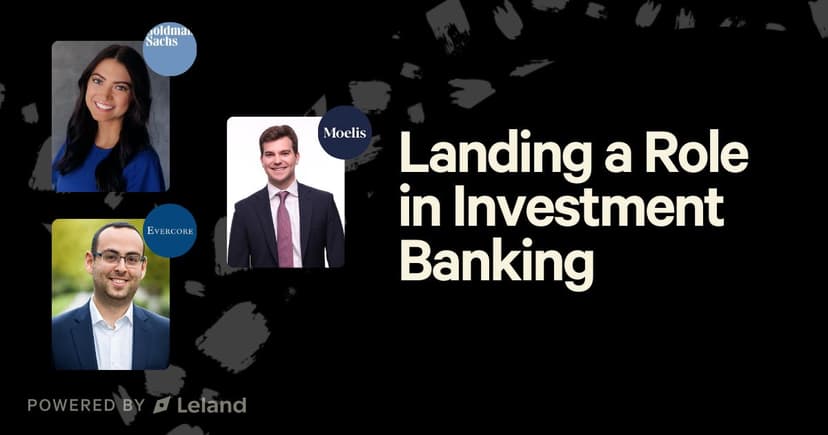20 Most Common Investment Banking Behavioral Questions
Prepare for investment banking interviews with expert tips on answering behavioral questions. Learn how to craft effective responses, avoid common mistakes, and use confident body language to stand out.
Posted October 25, 2025

Join a free event
Learn from top coaches and industry experts in live, interactive sessions you can join for free.
Table of Contents
Preparing for an investment banking interview can be a daunting task. While technical questions and industry knowledge are crucial, interviewers also value a candidate’s ability to handle behavioral questions. Behavioral questions are designed to assess your skills and personality traits, and they can be especially challenging because they require you to look within yourself to provide genuine and thoughtful responses that show you have the right strengths and values to succeed.
In this article, we will discuss why behavioral questions are important in investment banking interviews, the different types of behavioral questions you can expect to encounter, and how to prepare and craft effective responses that showcase your skills and achievements. Here is the investment banking interview guide for you.
Read: Investment Banking: What it Is & How it Works
Why Behavioral Questions Matter in the Investment Banking Recruiting Process
Behavioral questions are a crucial component of investment banking interviews because they evaluate not just a candidate's technical skills, but also their attributes, which are essential for thriving in the high-pressure world of corporate finance. These questions help employers assess how candidates handle challenges, work with teams, and manage stress in dynamic environments.
Assess Personal Qualities
In investment banking, employers seek candidates with strong communication, problem-solving, and leadership abilities. Behavioral questions give insight into these qualities by asking candidates to reflect on past experiences, such as managing a team project or resolving conflicts. For instance, a question about working with teams in complex situations involving financial statements or enterprise value can demonstrate a candidate's ability to maintain collaboration and leadership in high-pressure contexts.
Evaluate Past Experiences
Employers want to understand how candidates have handled challenges in the past, as this can indicate how they’ll perform under similar conditions. Behavioral questions prompt candidates to discuss past projects, highlighting their work ethic and how they approached learning opportunities. For example, discussing a situation where they applied DCF analysis to solve a complex issue shows how well they can handle financial analysis and net income adjustments.
Combine Interpersonal and Technical Skills
Investment banking requires candidates to seamlessly blend technical knowledge with interpersonal skills. Behavioral questions help interviewers understand how candidates apply their expertise, like equity value or cash flows. While working with others. For example, discussing a project where they used valuation methodologies like comparable company analysis to make decisions highlights their ability to combine financial knowledge with teamwork.
Understand Stress Management
Managing stress is a key part of the investment banking role, where long hours and tight deadlines are common. Behavioral questions reveal how candidates handle high-pressure situations. For example, when asked how they managed a stressful project involving capital expenditures or cash flow statement revisions, candidates show their ability to stay focused and maintain high performance under pressure.
Measure Conflict Resolution Skills
Investment banking often involves dealing with conflicts or differing opinions, especially around key financial assumptions such as a company’s capital structure or net debt. Behavioral questions assess how candidates handle these situations. When asked about resolving disagreements or addressing ethical dilemmas, candidates can demonstrate their ability to communicate effectively and maintain professionalism, which is vital for maintaining a collaborative work environment.
Examples of What Employers Look For
| Example | Description |
|---|---|
| Time Management | How you prioritized tasks, such as balancing multiple deadlines while completing an income statement or cash flow statement. |
| Problem-Solving | Stories about overcoming challenges, like reconciling errors in a company's free cash flow or revising assumptions for a discounted cash flow analysis. |
| Team Collaboration | Instances where you contributed to group success, such as completing a precedent transaction analysis or helping resolve disagreements on a market capitalization model. |
| Adaptability | Scenarios where you adjusted quickly to new information, such as recalculating a discount rate due to unexpected changes in interest rates. |
The Different Types of Behavioral Questions
Past Behavior Questions
These types of questions ask you to reflect on past experiences, to help interviewers understand how you’ve handled situations like team projects or challenges in areas such as financial analysis or capital markets. An example might be, “Tell me about a time you overcame a challenge,” where you would use the STAR method to describe the situation, actions, and outcome, such as improving a company’s equity value or completing a DCF analysis.
Hypothetical Behavior Questions
These are questions that present a future scenario to see how you would react. They assess your decision-making skills and problem-solving approach. For example, “How would you handle a disagreement with a team member over valuation methodologies?” These questions focus on how you might manage future cash flows or resolve conflicts related to a company’s capital structure.
Note: Some interviewers may ask a mix of past and hypothetical behavioral questions to understand how you’ve handled situations in the past and how you would approach future ones. Be prepared for both types of questions with specific examples ready to share. Reviewing common investment banking interview questions can help you prepare for both behavioral and technical inquiries.
Read: Mastering the Interview: Top 30 Questions Asked in Investment Bank Interviews
The 20 Most Common Investment Banking Behavioral Questions (With Answers)
1. Tell me about a time when you worked on a team with conflicting opinions.
Sample Answer: In a financial analysis project, we had differing views on using comparable company analysis vs. discounted cash flow analysis (DCF). As an investment banker, I recognized the importance of teamwork, so I proposed a hybrid approach that combined both methodologies. This allowed us to refine the valuation and present a more comprehensive analysis to our clients.
2. How do you handle working with someone whose style differs from yours?
Sample Answer: I once worked with a colleague who preferred high-level summaries, while I prefer detailed analysis. To align, I started by presenting concise overviews and followed up with the detailed models in the appendix. This approach ensured clarity and allowed us to work efficiently together.
3. Describe a time when you had to collaborate on a high-pressure project.
Sample Answer: While preparing for an IPO, we had 48 hours to finalize the three financial statements. I delegated tasks based on team strengths, such as handling the income statement to one person and the cash flow statement to another. Regular check-ins helped ensure we were on track, and we delivered the financials on time.
4. What role do you typically play in a team?
Sample Answer: I naturally step into the role of the coordinator, ensuring clarity in task delegation, setting deadlines, and helping teammates stay focused on the overarching goal, especially when working on a financial model or preparing for an M&A transaction.
5. Describe a time when you helped resolve a team conflict.
Sample Answer: Two team members disagreed on assumptions for a weighted average cost of capital (WACC) calculation. I facilitated a discussion, providing data to support the most logical approach, and helped the team agree on the most accurate figure for the financial analysis.
6. Give an example of when you took the initiative to solve a problem.
Sample Answer: During an internship, I noticed a miscalculation in a client's enterprise value due to outdated market capitalization figures. I recalculated the numbers using current data, which saved the firm from submitting an inaccurate report to the client.
7. How do you motivate a team to achieve a goal under pressure?
Sample Answer: During a capital markets pitch, I motivated the team by breaking down the project into achievable milestones. We celebrated each small victory, such as finalizing the revenue growth assumptions, which kept morale high and the project moving forward.
8. Can you describe a time when you had to lead a team through uncertainty?
Sample Answer: In a client project, a last-minute shift in focus required us to revise our financial models to emphasize discounted cash flow (DCF) analysis. I reassured the team, realigned our goals, and provided clear direction, helping us stay on course and meet the client’s expectations.
9. How do you handle pushback when leading a team?
Sample Answer: While leading an M&A analysis, some team members disagreed on the valuation techniques. I addressed their concerns by explaining the rationale behind the selected method and incorporated feedback to build a more comprehensive financial model.
10. What’s a time when you delegated tasks effectively?
Sample Answer: During an equity offering project, I delegated financial modeling to one colleague and market research to another, while I focused on coordinating the final presentation for the investor equity pitch. This delegation allowed us to meet the tight deadline while maintaining accuracy.
11. Describe a time when you solved a problem with limited information.
Sample Answer: During a valuation project, we had limited financial data for a target company. I used precedent transaction analysis and industry averages to estimate key metrics like net income and enterprise value, providing a reliable foundation for the valuation.
12. Tell me about a time you analyzed complex data to make a recommendation.
Sample Answer: I analyzed discrepancies in a client’s cash flow statement and uncovered inefficiencies in their working capital. My recommendations improved their liquidity management and led to a more accurate financial forecast for the next fiscal year.
13. How have you handled ambiguity in a project?
Sample Answer: During a market analysis, incomplete data on interest rates forced me to create multiple scenarios. This helped us prepare for varying outcomes, allowing the team to proceed with caution while maintaining flexibility.
14. What’s an example of how you approached a seemingly unsolvable problem?
Sample Answer: When a client’s financials seemed inconsistent, I reconstructed their income statement from detailed transactional data. This helped resolve the discrepancies and provided the client with an accurate financial picture for their upcoming funding round.
15. How do you prioritize tasks when solving a time-sensitive issue?
Sample Answer: I prioritized tasks based on their impact on the outcome. For example, when finalizing a cash flow statement for a transaction, I made sure to address critical items like capital expenditures before addressing less urgent tasks like formatting presentation slides.
16. Describe a time when you had to adjust to last-minute changes.
Sample Answer: While working on a client pitch, we received updated financials hours before the meeting. I quickly revised our financial model and presentation to include the latest data, ensuring we presented the most accurate information.
17. How have you balanced competing priorities in a fast-paced environment?
Sample Answer: I created a task list based on urgency and impact. High-priority items, like finalizing capital structure adjustments, were completed first, while less urgent tasks were deferred until after the main deliverables were finished.
18. Tell me about a time when you quickly adapted to new information.
Sample Answer: During an IPO, a sudden regulatory change affected our assumptions. I revised the discount rate and updated the terminal value projections accordingly, ensuring the financial model was aligned with the new regulations.
19. What’s an example of how you handled an unexpected setback?
Sample Answer: When a team member missed a deadline for an important analysis, I took over their portion of the cash flow review, allowing the project to stay on track for the final submission.
20. How do you maintain productivity under changing circumstances?
Sample Answer: I stay productive by focusing on the most critical tasks first. I adapt to new circumstances, such as last-minute client requests, by adjusting my schedule and workflow to accommodate urgent changes while maintaining quality.
Read: Investment Banking Interview Guide: What to Know in 2025
How to Prepare for Behavioral Questions in Investment Banking Interviews
Review the Job Description
When preparing for investment banking interviews, the first step is to carefully review the job description. Focus on the key skills and traits needed for the role. In investment banking, the ability to perform financial modeling and handle complex financial statements is crucial. You’ll likely be asked about your experience with valuation methodologies such as discounted cash flow analysis (DCF) and how you assess equity value or enterprise value. Be sure to familiarize yourself with terms like net income, cash flow statements, and capital asset pricing model, as they are fundamental to understanding the firm’s work in capital markets.
Why Investment Banking?
Prepare to answer "Why investment banking?" Reflect on why you’re drawn to the industry, beyond just the financial rewards. Talk about your passion for corporate finance, the excitement of analyzing market capitalization, and your interest in solving complex problems involving equity investors. Demonstrate your understanding of the industry’s fast-paced nature, and highlight how your background in financial analysis or comparable company analysis aligns with your career goals in investment banking.
Reflect on Your Experiences
Behavioral questions in investment banking interviews typically ask you to provide examples from your past. Use the STAR method (Situation, Task, Action, Result) to structure your answers. Prepare specific examples where you demonstrated skills like problem-solving, leadership, and teamwork. For example, when asked about working under pressure, you can discuss a time you worked on a valuation analysis under tight deadlines, ensuring accuracy in net present value or unlevered free cash flow calculations.
Practice with Others
Mock interviews are essential for refining your responses. Conduct interviews with a friend or mentor who can provide feedback on both your answers and delivery. Make sure you can clearly explain technical questions such as the differences between interest expense and guaranteed fixed payments, or how you calculate the company's equity in a DCF analysis. Practicing will also help you become comfortable discussing concepts like tax-deductible items or net debt in the context of an M&A deal.
Research the Company
Before the interview, thoroughly research the company’s culture and values. Align your answers to show how your approach matches their priorities, whether it’s in capital markets innovation or a focus on financial performance. Be ready to discuss how you would contribute to the firm’s work on capital expenditures, revenue growth, or the company’s assets. This will demonstrate that you’re not just a fit for the role but also for the company’s culture and objectives.
Be Authentic
While it’s important to prepare thoroughly, it’s equally important to be authentic. Behavioral questions aim to assess your character and problem-solving abilities. Don’t focus on crafting a "perfect" answer. Instead, provide real examples that showcase your technical skills, how you handle challenges, and how you maintain professionalism in high-pressure situations, such as leveraged buyouts or managing accounts receivable during a tight deal cycle.
Mind Your Body Language
In an investment banking interview, your body language speaks volumes. Sit up straight, maintain eye contact, and avoid fidgeting. This helps project confidence, which is key in an industry that values decisiveness and professionalism. When discussing projects like precedent transaction analysis or capital structure adjustments, having positive body language will reinforce your command of the subject matter and boost your credibility.
Prepare Examples for Common Scenarios
Be prepared with examples that highlight your experience in situations typical of investment banking roles. Whether it’s meeting tight deadlines, managing a company’s cash flows, or working with equity investors, having these stories ready will demonstrate your ability to thrive in high-pressure situations. Prepare examples where you successfully navigated complex valuation analyses, adjusted to changing future cash flows, or made critical decisions during M&A or capital markets transactions.
Note: Behavioral questions are designed to assess your character and how you handle certain situations. Therefore, it’s important to be honest and authentic in your responses. Don’t try to give the “perfect” answer, but rather focus on providing a genuine response that showcases your personality and problem-solving skills.
Read: Time Management in Investment Banking Interviews: How to Prioritize Your Answers
Crafting Effective Responses to Behavioral Questions
When preparing for investment banking interviews, the goal is to be specific, concise, and honest.
Be specific
Start by being specific. Use concrete examples to show how you've applied your skills. For instance, if asked about a time you worked on a discounted cash flow analysis (DCF) or resolved a conflict over a company’s cash flow, explain the steps you took. These examples will highlight your expertise in corporate finance and financial modeling.
Keep your answers concise
Keep your answers concise. The STAR method (Situation, Task, Action, Result) works great here. Let’s say you had to fix an error in a financial statement. Just briefly describe the situation, the action you took, and the positive outcome. This keeps your answer focused and avoids unnecessary details.
Be honest
Don’t be afraid to share real experiences, even if they include mistakes. If you miscalculated a valuation model or missed an assumption, own up to it and explain how you corrected the issue. This shows integrity and your ability to learn from challenges.
Note: Keep your answers specific, concise, and honest. This approach will demonstrate both your technical skills and your ability to handle challenges in the high-pressure world of investment banking.
The Do's and Don'ts of Answering Behavioral Questions in Investment Banking Interviews
| Category | Do’s | Don’ts |
|---|---|---|
| Preparation | - Practice potential questions about cash flow, enterprise value, or capital expenditures. | - Avoid showing up unprepared. Not practicing responses can lead to vague or disorganized answers. |
| Specificity | - Use measurable examples, like contributing to a successful leveraged buyout analysis or resolving conflicts in team valuations. | - Don’t be vague or general. Avoid statements like "I work well with teams" without providing concrete examples. |
| Honesty | - Be truthful in your responses, even when discussing mistakes or challenges. Explain what you learned or how you resolved the issue. | - Don’t exaggerate or fabricate stories, such as claiming sole credit for a team effort or overstating your role in a discounted cash flow analysis. |
| Tone | - Stay positive and solution-focused. Highlight how you overcame challenges or contributed to team success. | - Don’t focus on negatives. Avoid dwelling on failures without showing how you improved or resolved the situation. |
| Composure | - Remain calm and thoughtful when answering difficult questions. Take a moment to think about your response if needed. | - Don’t be defensive. Avoid blaming others or appearing flustered when discussing tough situations, like conflicts in a valuation methodologies project. |
| Clarity | - Keep your answers concise and to the point. Use structured methods like STAR (Situation, Task, Action, Result) to organize your responses. | - Don’t ramble or include irrelevant details. Stay focused on the question and align your answers with investment banking roles and responsibilities. |
Mistakes to Avoid in Investment Banking Behavioral Interviews
How you respond to behavioral questions plays a crucial role in the interview process. Below are some common mistakes to avoid to help you craft strong and effective answers.
Being Too General or Vague
One of the most frequent mistakes is being too general in your responses. Statements like, “I’m good at teamwork,” don’t offer any real insight into your skills. Instead, be specific. Share detailed examples that demonstrate your experience. For example, discuss how you resolved a disagreement during a comparable company analysis or how you worked with a team to forecast net income. This makes your answer more memorable and gives interviewers a better understanding of your skills in corporate finance.
Being Too Long-Winded
Another common mistake is providing overly long or detailed answers. While it is important to be thorough, you should stick to the question and avoid unnecessary backstory. Interviewers appreciate clear, concise answers. For example, if asked how you managed tight deadlines, focus on how you met a deadline for three financial statements or updated a balance sheet under pressure, without delving into unrelated details. This will keep your response sharp and to the point.
Being Unprepared
Lack of preparation can make your responses appear weak or hesitant. Being prepared is crucial to showcasing your knowledge and confidence. Practice answering questions about essential topics such as raising capital, market capitalization, or managing future cash flows. This will ensure that you can respond to banking interview questions confidently, demonstrating that you're ready for the challenges in investment banking.
Being Dishonest
Honesty is crucial in an interview. Exaggerating or fabricating examples can damage your credibility. Instead, share truthful accounts of your experiences, even if they involve challenges or setbacks. For example, if you missed an assumption in a valuation model, explain how you identified the mistake and corrected it. Being open about your mistakes shows integrity and demonstrates your ability to learn and grow from experiences.
How Your Body Language Can Affect Your Response to Behavioral Questions in Investment Banking Interviews
| Body Language Tip | Why It Matters | Advice |
|---|---|---|
| Maintain Eye Contact | Demonstrates engagement and confidence. | Look directly at the interviewer without staring. This shows that you are attentive and self-assured. |
| Sit Up Straight | Conveys professionalism and confidence. | Keep a neutral posture with your back straight and shoulders relaxed to project composure. |
| Smile | Builds rapport and shows enthusiasm. | Builds rapport and shows enthusiasm. |
| Avoid Fidgeting | Prevents distraction and reduces the appearance of nervousness. | Keep your hands steady and avoid tapping, playing with objects, or shifting excessively in your seat. |
5 Expert Tips to Nail Your Investment Banking Interviews
1. Use the STAR Method with Investment Banking Examples
The STAR method (Situation, Task, Action, Result) is a great way to structure your answers, but tailor it for investment banking. When explaining the Task, connect it to technical skills like DCF analysis or assessing equity value. In the Action section, focus on measurable actions, such as adjusting net working capital or refining market capitalization assumptions. This makes your answer focused and shows you understand the technical aspects of the job.
2. Balance Technical and Soft Skills in Your Answers
In investment banking interviews, showcase both your technical and soft skills. For example, when discussing leadership, highlight how you used valuation methodologies, made decisions about future cash flows, or adjusted key metrics in a financial model. This demonstrates your ability to handle complex financial details while leading effectively.
3. Link Your Examples to the Firm's Long-Term Goals
When answering questions about past projects, always connect your actions to the long-term goals of the firm. For example, if you worked on an IPO, explain how your work helped raise capital or improve capital expenditures for future growth. This shows that you understand how your role fits into the bigger picture of driving shareholder equity and company value.
4. Incorporate Numbers and Metrics Whenever Possible
Numbers speak volumes in investment banking. Whenever you can, include quantifiable metrics to strengthen your answers. For example, if you fixed errors in financial statements under pressure, mention how you improved accuracy by a specific percentage or met the deadline ahead of time. This approach demonstrates your ability to work under pressure while delivering results.
5. Prepare for Follow-Up Questions: "What Would You Do Differently?"
Be ready for follow-up questions like, "What would you have done differently?" After explaining a project, reflect on what you could have done better, such as adjusting a valuation methodology or improving a cash flow forecast. This shows that you're self-aware and always looking for ways to improve, which is an important trait in investment banking.
The Bottom Line
Preparing for investment banking interviews involves more than just mastering the technical aspects. It is also about demonstrating how you tackle challenges, manage pressure, and collaborate effectively with others. Behavioral questions provide the perfect opportunity to showcase these skills. To stand out, use specific examples from your own experience, such as how you handled financial modeling, worked on equity value, or navigated cash flow analysis. The STAR method (Situation, Task, Action, Result) helps keep your answers clear and organized. Being honest is also crucial. Share real experiences, even if they include setbacks, as this shows your willingness to learn and grow.
Make sure to prepare by practicing key topics like raising capital or managing future cash flows, which will boost your confidence. Finally, be mindful of your body language: maintain eye contact, sit upright, and avoid fidgeting to convey confidence. By being prepared, genuine, and relaxed, you’ll make a strong impression and show you're ready for the challenges of investment banking.
Work With Investment Banking Coaches
Get ready for your investment banking behavioral interview with help from an expert coach. Practice key questions, sharpen your skills, and build confidence to stand out. Start preparing for success today!
Related Articles:
- The Top 20 Most Frequently Asked Investment Banking Technical Interview Questions
- 35+ Free Resources to Break Into Investment Banking
- How to Nail the Second Most Common Investment Banking Interview Question ("Why This Firm?")
- Top 10 Finance Mentors
- How to Answer the "Why Investment Banking?" Interview Question
- 25+ Questions To Ask At a Career Fair
- The Best MBA Programs for Investment Banking
- 20+ Best Questions to Ask at the End of an Interview
FAQs
What are behaviorals in investment banking?
- Behavioral questions in investment banking interviews assess how candidates handled situations involving teamwork, leadership, and problem-solving under pressure, often in the context of financial modeling, discounted cash flow analysis, and capital markets activities.
How to prepare for investment banking interviews?
- To prepare for investment banking interviews, focus on mastering financial modeling, valuation methodologies like DCF analysis, and understanding financial statements (income statement, balance sheet, cash flow statement). Use the STAR method for behavioral questions, showcasing your experience in handling challenges like adjusting equity value or managing future cash flows. Stay updated on capital markets and practice both technical and behavioral questions to build confidence.
What are the 4 pillars of investment banking?
- The four pillars of investment banking are Mergers & Acquisitions (M&A), Underwriting, Sales & Trading, and Research. M&A focuses on company valuation, including equity value and enterprise value. Underwriting involves helping clients raise capital, often using DCF valuation. Sales & Trading is about buying and selling securities, analyzing cash flows, and interest payments. Research provides investment recommendations based on the company's net income and capital expenditures.
Is a 3.7 GPA good enough for investment banking?
- A 3.7 GPA is competitive for investment banking, but technical skills and real-world experience are equally important. Demonstrate proficiency in financial analysis, valuation methodologies, and understanding company’s cash flows. Experience in capital markets or handling net debt can compensate for a slightly lower GPA, especially if you're strong in practical areas like DCF analysis and capital structure.


























